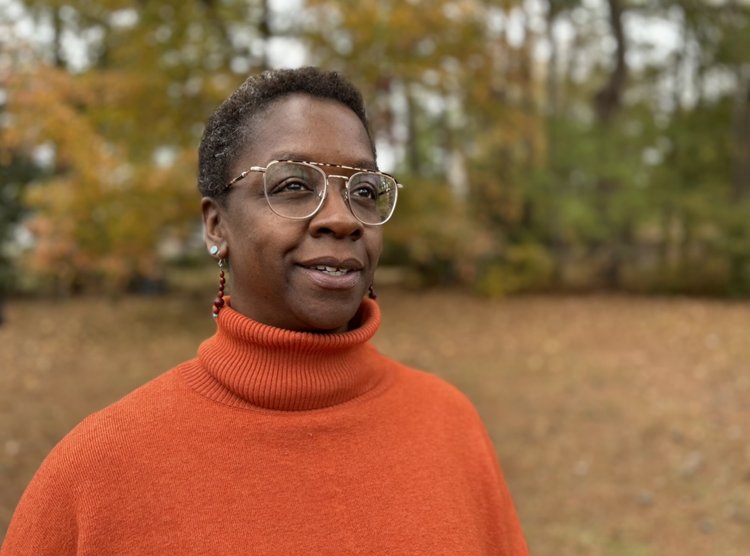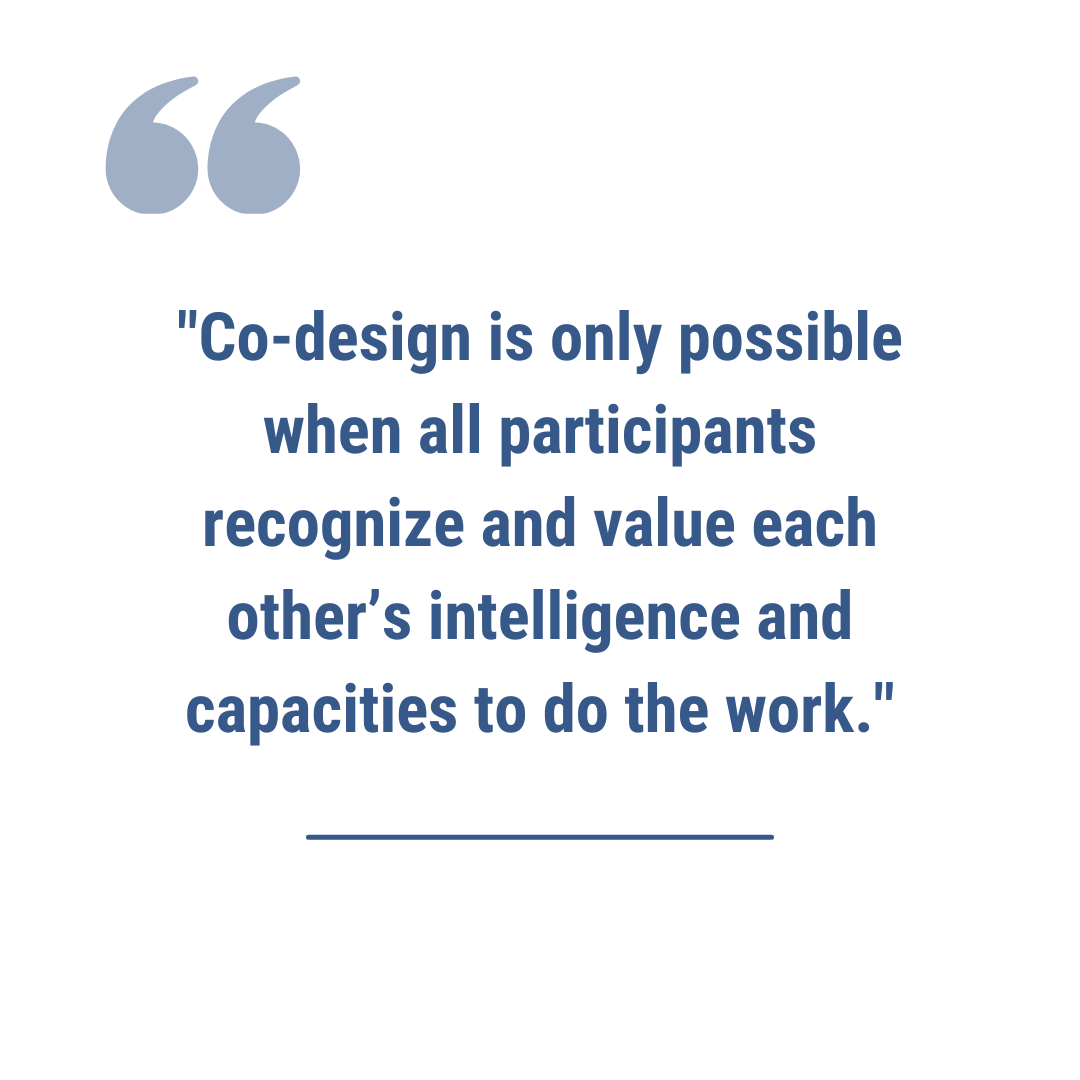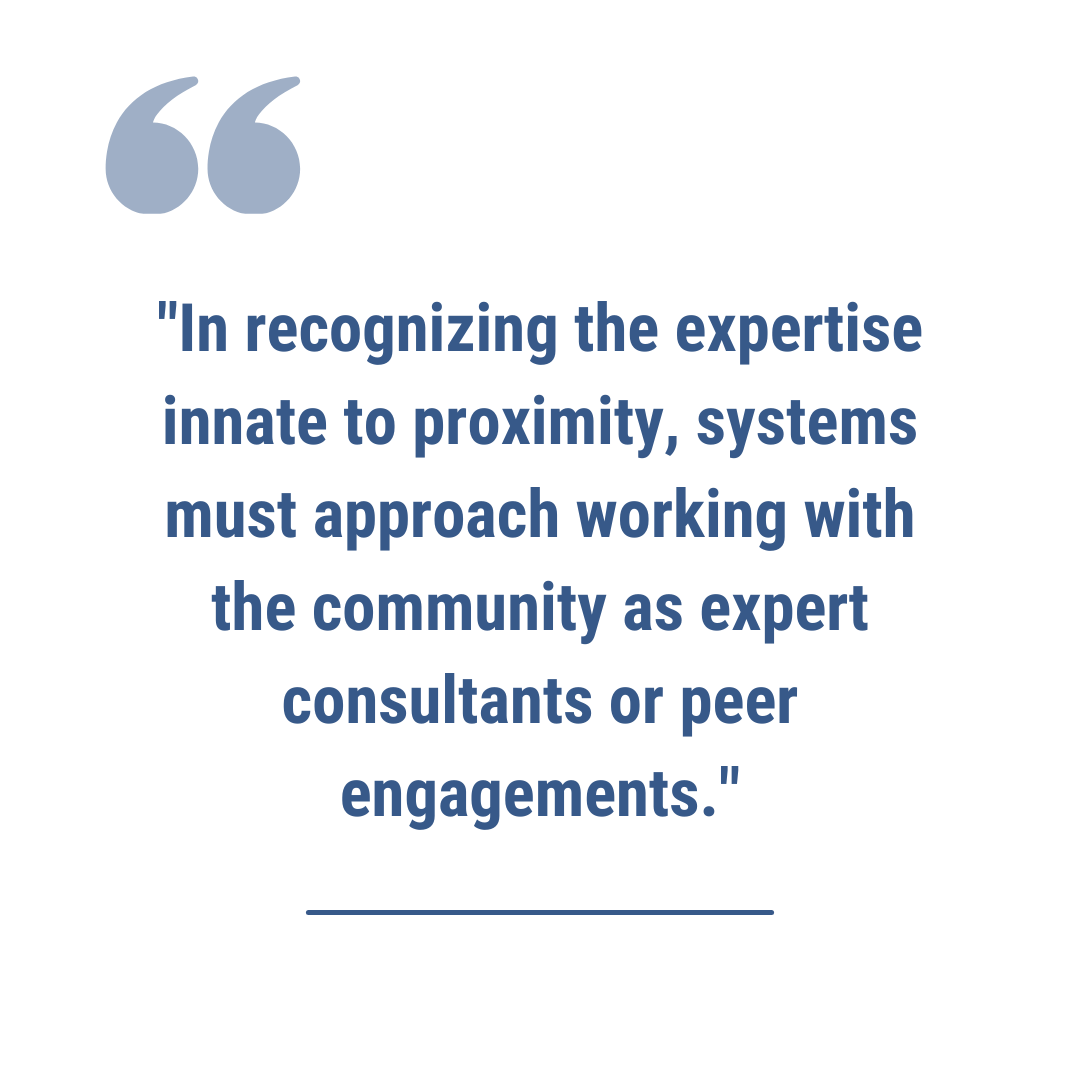The Value of Proximity
By Tecoria Jones
Our guest blogger is Tecoria Jones. A South Carolina native, she has long been an advocate and expert in the child well-being space. We welcome her perspective on integrating more lived experience into systems-change work.
Note from Tecoria: I often sit in spaces with people whose demographics do not reflect any proximity to the real experiences of poverty, adverse experiences, and racism. I offer actionable solutions based on my active insight and first-hand knowledge of the experience. Too often, contributions are attributed to studies and focus groups, to which participation requires deidentification. To “de-identify” is to separate the ideas or insights shared from the person who shared them. In recognizing the need to do this work, we must acknowledge the crosswinds of being unvalued, under or non-compensated, and excluded from ongoing solution finding while being the closest to the problem. We must shift that involvement lever with acknowledgement and appreciation.

The Value of Proximity
Sociology studies the development, structure, and functioning of human society. Societies develop around and create various conditions and concepts, which form the structure by which society functions. Certain conditions make for different experiences. I consider myself somewhat of a sociological explorer. I want to discuss an important concept called active insight. Active insight is first-hand knowledge that speaks to the value of thinking, learning, observing, and doing based on proximity.
Why is active insight a critical concept to understand in sociology? As a sociological explorer, I know societies don’t just pop up. Societies are built by the people who participate in them. To best understand 21st-century society, active insight is critical. First-hand knowledge that speaks to the value of thinking, learning observing, and doing based on proximity means that understanding what is happening now requires talking to the people. When this insight is excluded by individuals attempting to understand society, the conclusion reached only reflects part of the reality. When looking at the development, structure, and functioning of this 21st-century society, I see a lot of concerns, and I am compelled to make sense of it. A sociological condition that gets my attention is poverty. It draws a vital question–How has poverty shown up in the development, structure, and functioning of our present-day society? Let’s explore.
Living in poverty is a condition for many Americans; in fact, many humans across the world face it. Recent studies from the Sisters of Charity Foundation of SC (SOCF) illustrate how poverty marginalizes and isolates populations and how that separation from general society decreases and diminishes well-being. Generational poverty has been influenced and underpinned by the conditions and structures of chattel slavery in the development, structure, and functioning of our society. Chattel slavery created a dysfunctional, yet organized society based on skin color. When looking at poverty research, Black and Brown people are over-represented according to numbers in the general population; this is disproportional.
Elevating Lived Experience As Expertise
Looking back at my reality, I graduated high school a year early to escape the children’s home. I only needed two credits, so I went to summer school while in Upward Bound and earned my high school degree a month after my 17th birthday. I was a ward of the state, so once I graduated, I was independent. But it was more like abandoned and alone. A dark-skinned Black and kinky-haired woman in the South, I was a double negative; my interdisciplinary way of thinking made me a triple threat. Making relationships was never a priority because the ones who were supposed to show me love could not. I could not keep secrets, so I was the outcast. I have been intricately impacted by the lack of connection.
Looking at the adversities of my young life and how becoming a single parent led directly to the experience of living in poverty and systems interventions, I can bear witness to a life that is nothing short of miraculous. I am God’s Child. Finding strength and courage in resilience and the need to continue to show proof to the Creator for my thankfulness for life has allowed me to overcome obstacles many cannot imagine exist, much less find a way through. I am courageous. I have worked hard and been devoted to navigating, maneuvering, and helping others to do the same. I am caring. I advocate and consult in state and federal level spaces, including work in ‘first of its kind’ engagements. I am intelligent.
Nonetheless, I was and continue to be impacted by the conditions and systems of poverty that have existed and been perpetuated for centuries. When it comes to understanding what living in these conditions of poverty means, why are we only looking at quantitative research and “complex data? The research gathering has gone on for generations, with little to no lasting impact on reducing poverty, all while watching communities continue in marginalization, imbedded in poverty.
How are the practitioners of the work connected to poverty? Many have never, in generations, tasted the flavor of poverty. It leaves those of us connected to it questioning, what can they know of how to end it? Can they fully understand how poverty narrows life? When will we know enough to do something that changes society to the point that poverty no longer exists? I say we know enough already, and the real reason why nothing has happened is that we are missing the catalyst for this social solution. That catalyst is active insight.
The people who think and learn, observe, and do in proximity to poverty are the people who have the best ideas for the most plausible solutions. People living in poverty are wholly observant of their conditions and what that looks like, what that means, and how that feels. We have spent generations in these conditions, and we have expertise in the conditions of poverty. The information available in active insight is what is needed to build viable pathways out of poverty. This means that organizations receiving moneys to end poverty must collaborate and co-design with the people living the experience as equal partners and peers in the work. Co-design is only possible when all participants recognize and value each other’s intelligence and capacities to do the work.
This may feel difficult. For a long time, the system agencies that address health and other human needs in this country upheld a structure that operates from a perspective that favors those with higher economic status, leaving an inherent imbalance of power and a disconnect from the issue.
It is painful to think about the terrible days of chattel slavery. But it happened, had consequences, and resulted in visible inequities. In seeking to remedy these conditions, organizations must understand that the social systems in America are built by old structures. These structures were implemented to pursue a means for some while marginalizing, limiting, and reducing others.

Where are Organizations’ Opportunities for Improvement?

There is a difference between things that happen, and that’s just the way it is, versus things that happen, and how it was meant to be. There is a point in a plan when the blueprints get put down, and the tools get picked up. The research will always be part of the work, as it acts as an accountability measure and progress evaluation.
Research is our instruction, but the tools to do the work of developing functional solutions to end poverty and marginalization are in the community’s hands, whetted and honed in trusted partnership with equitable systems.
For systems and their structures, the value of creating relationships with active insight is the thinking, learning, observing, and doing of the people in proximity to the condition. Communities need help from systems because the structure of the systems is what precipitated the conditions. In recognizing the expertise innate to proximity, systems must approach working with the community as expert consultants or peer engagements.
System-proximate nonprofits and philanthropic organizations are in an extraordinary place. The ability to set a mission and work rooted in values like equity and community-based assets provides a transformative structure building. Community-centered work requires iterative work; there will be need for periods of adjustment. Iterative work allows for the emergence to meet the need at hand. Emergence is proof of transformation.
In closing, be reminded that the structures and the systems are in place because of decisions that a small representation of our society made hundreds of years ago. We know much more about the repercussions of the dysfunctional organized society rooted in harm. Are people in the systems going to find solutions that work based on their far-removed-from-the-condition perspective, or can they begin to value the active insight of the people living in the condition, in the here and now? Will the people in the systems appreciate the people with active insight as real, substantive, and equally capable of building solutions? I know we should. I think we can. I hope this is a start.


